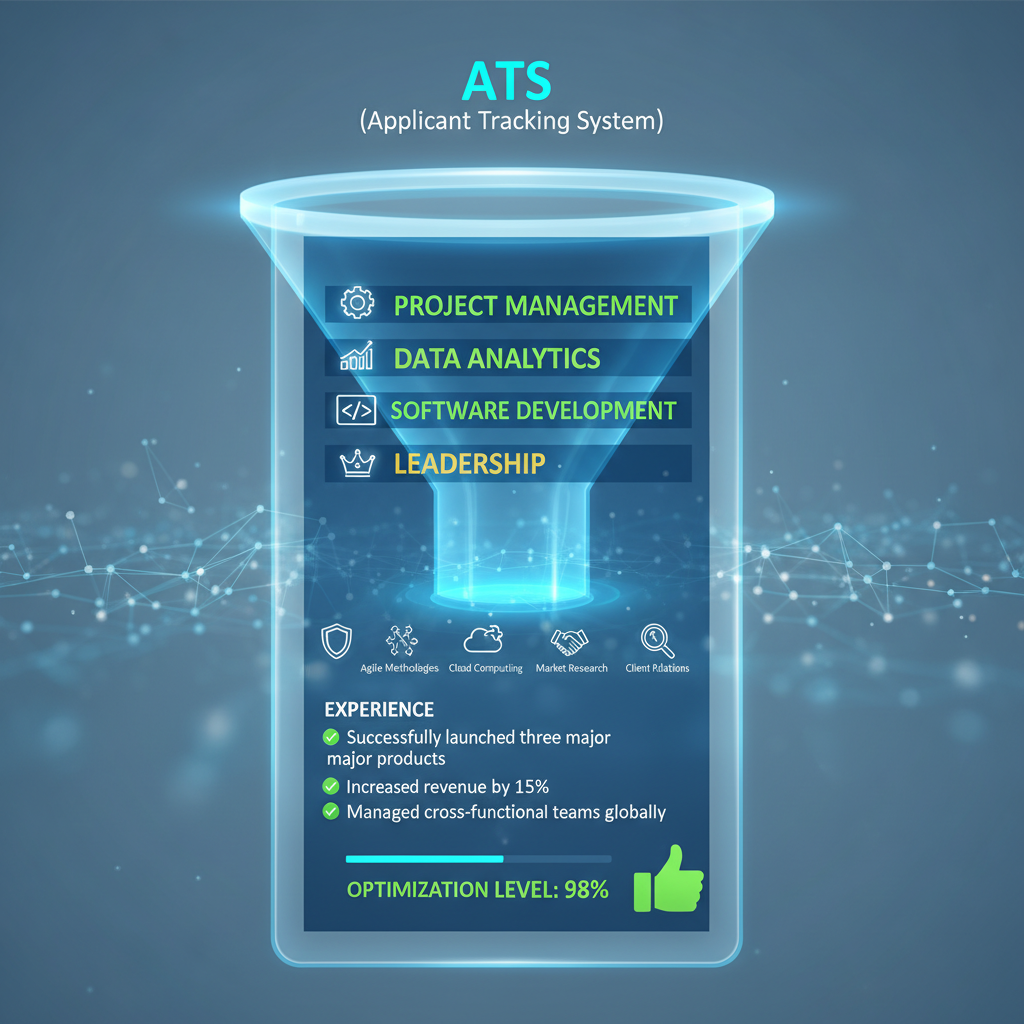The Ultimate Guide to Resume Keywords in 2025: Beat the ATS & Get Interviews


Ready to Ace Your Next Interview?
Practice unlimited AI-powered interviews on Huru.ai and get instant feedback on your performance. Start free today!
Why Resume Keywords Are Your Secret Job Search Weapon in 2025
In 2025, with over 75% of employers using Applicant Tracking Systems (ATS), resume keywords are more vital than ever. These are the specific terms, skills, and phrases pulled directly from job descriptions that ATS software uses to filter and rank applicants. If your resume lacks the right keywords, it may never reach a human recruiter—no matter how qualified you are.
Why does this happen? Modern ATS tools scan your resume for
relevant keywords related to skills, certifications, experience, and achievements. Including these strategically ensures your application survives the first round of screening.
Bottom line: Mastering resume keywords is the fastest way to get noticed and land interviews in today’s competitive market.

Demystifying ATS: How Applicant Tracking Systems Score Your Resume
Applicant Tracking Systems (ATS) are software tools employers use to automate resume screening. But how exactly do they work?
Key functions of an ATS:
- Keyword Parsing: Scans for specific skills, experience, and job titles from the job description.
- Contextual Analysis: Looks for keywords in context (e.g., achievements, duties, certifications).
- Ranking & Scoring: Assigns a match score based on keyword frequency and relevance.
- Filtering: Only resumes with sufficient matches get passed to human eyes.
Modern ATS tools are getting smarter in 2025—they can recognize synonyms, related skills, and even infer leadership or teamwork from context (e.g., “led cross-functional teams”). To stay ahead, you need both the right keywords and the right context.
💡 Key Takeaway
It’s not just about stuffing your resume with keywords—context and natural placement are now essential for beating the ATS and impressing recruiters.
Keyword Research: Where to Find the Best Resume Keywords
The most effective resume keywords come from the job description itself. But you can go further:
- Job Description: Highlight required skills, responsibilities, certifications, software, and education.
- Industry Buzzwords: Look for trending skills and core competencies in your field (e.g., “Agile methodology,” “data analysis”).
- Online Tools: Platforms like Jobscan and Huru.ai’s resources can analyze your resume and suggest additional keywords.
- Professional Profiles: Scan LinkedIn profiles of top professionals in your target role.
Pro tip: Use semantic keyword clusters—different variations and related terms for a broader ATS match (e.g., “project management,” “managed projects,” “project coordinator”).
Integrating Keywords Like a Pro: Natural Placement & Contextual Power
To win over both the ATS and the recruiter, keywords must be integrated seamlessly into your resume:
- Professional Summary: Start your resume with a punchy summary loaded with high-impact keywords that match your target role.
- Core Skills Section: Create a bulleted list of your top 8–12 skills, using exact terminology from job listings.
- Experience Section: Weave keywords into your achievements and responsibilities, not just as a list, but as part of real, quantifiable results (e.g., “Increased sales by 20% through data-driven marketing strategies”).
- Certifications & Education: Include formal credentials and industry-standard terms.
Bonus Tip: ATS now scans for synonyms and related keywords, so use varied language—“collaborated” in one bullet, “partnered” in another.
💡 Key Takeaway
Always prioritize clarity and readability. Recruiters want to see how you applied key skills, not just that you listed them!
2025’s Most Powerful Resume Keywords by Industry
Hiring trends shift—and so do the hottest resume keywords. Here’s a sampling of in-demand keywords employers and ATS will be scanning for in 2025, organized by industry:
| Industry | Top Keywords for 2025 |
|---|---|
| Technology | Cloud Computing, DevOps, Python, Cybersecurity, Agile, Data Analytics, AI Integration |
| Marketing | Digital Campaigns, SEO, Paid Social, Brand Strategy, Google Analytics, CRM, Content Creation |
| Healthcare | Telemedicine, Patient Care, HIPAA Compliance, Electronic Health Records, Case Management |
| Finance | Risk Analysis, Financial Modeling, Regulatory Compliance, M&A, Investment Strategy |
| Sales | Pipeline Development, B2B Sales, Account Management, Lead Generation, CRM Platforms |
| Education | Curriculum Design, Remote Learning, EdTech Integration, Assessment, Student Engagement |
Tip: Tailor these keywords to your unique role—never copy-paste! Use them as inspiration to match your genuine experience.
Common Keyword Mistakes That Sabotage Your Resume (and How to Fix Them!)
Avoid these frequent errors—many qualified candidates miss out simply because of keyword blunders:
- Keyword Stuffing: Overloading your resume with keywords makes it unreadable and suspicious to recruiters.
- Ignoring Synonyms: ATS software in 2025 recognizes variations—don’t use only one version of a key skill.
- Copy-Pasting Job Descriptions: Use your own words and context. Mirror the job description, but don’t duplicate it.
- Generic Language: “Responsible for” is out. Use impactful action verbs and specifics.
- Outdated Keywords: Always use the latest industry terms—check LinkedIn, industry reports, and current job ads.
Remember: A keyword-optimized resume is both machine- and human-friendly.
💡 Key Takeaway
After updating keywords, proofread your resume for clarity, flow, and impact. Then run it through a tool like Huru.ai for instant feedback!
How Huru.ai Supercharges Your Resume and Interview Confidence
Huru.ai doesn’t just help you ace interviews. Its platform provides:
- Instant, actionable feedback on your answers, tone, and communication.
- Unlimited interview practice in a real-world, ATS-like environment.
- Personalized recommendations to boost your keyword integration skills.
- A detailed guide on SEO for your resume to maximize your job search potential.
Level up: Use Huru.ai after each resume update to track how your keyword strategy improves your interview readiness and employer match rate.
Resume Keyword FAQs: What Job Seekers Want to Know in 2025
Q: Can I use the same resume for every job?
A: No! Each application should be tailored with keywords from that specific job’s description. Batch applying with a generic resume rarely works in 2025.
Q: What is the ideal keyword density?
A: There is no magic number. Focus on natural integration—generally, each primary keyword should appear 2-3 times, but not at the expense of readability.
Q: Are soft skills keywords important?
A: Absolutely! Terms like “collaboration,” “leadership,” and “adaptability” are often picked up by ATS and valued by recruiters.
Q: How do I test my resume’s keyword effectiveness?
A: Use Huru.ai or similar ATS simulators to scan your resume before applying.
Q: Will AI change how resumes are screened?
A: Yes! AI-driven ATS platforms in 2025 are smarter than ever—context, outcomes, and varied language are all important.
Watch: Practical Resume Keyword Strategies in Action
For a step-by-step demonstration on researching and integrating keywords into your resume, check out this expert video:
(Video: Practical Resume Keyword Strategies for ATS in 2025)
💡 Key Takeaway
Strategic keywords can open doors—but you must update, test, and refine your resume for each opportunity!
Your Next Steps: From Resume Keywords to Interview Mastery
Employers now expect more than just the right skills—they want context, impact, and polish. That’s why Huru.ai’s ecosystem goes beyond resume optimization to help you master interviews, communication, and self-presentation.
Explore these resources to advance your job search:
- Resume Tips For Executives And Senior Leaders Showcase Your Expertise
- Crafting A Resume With No Experience Tips For Students And New Graduates
- How To Write A Professional Resume And Cover Letter In English With Grammar Tips That Make You Shine
- Common Resume Mistakes To Avoid Dont Sabotage Your Job Search
- Portfolio Prep For Creatives Huru Ais Tips To Impress
Every great interview starts with a resume that gets you in the door. Make your next one count!
About the Author
Elias Oconnor is a seasoned content writer at Huru.ai, specializing in career development, job search strategy, and interview confidence. Elias is passionate about empowering job seekers with practical advice and innovative tools. Find more expert tips and resources at huru.ai.



 Jun 15,2024
Jun 15,2024  By Elias Oconnor
By Elias Oconnor